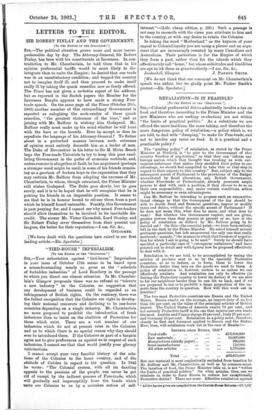• -LETTERS TO- THE EDITOR.
SIR ROBERT FINLAY AND THE GOVERNMENT.
LTO THE EDITOR OP THE SPECTATOR:1
Srn,—The political situation grows more and more incom- prehensible day by day. The Attorney-General, Sir Robert Finlay, has been with his constituents at Inverness. In con- tradiction to Mr. Chamberlain, he told them that• in his opinion preferential tariffs would be more likely to dis- integrate than to unite the Empire ; he denied that our trade was in an unsatisfactory condition; and begged the country not to imagine itself ill, and then proceed to make itself really ill by taking the quack remedies now so freely offered. The Times has not given a verbatim, report of his address, but as reported in the Scotch papers the Member for the Inverness Burghs appears to have made a strong Free- trade speech. On the same page of the Times (October 20th, 1903) another member of this extraordinary Government is reported as eulogising the arch-vendor of these quack remedies, "the greatest statesman of the time," and as joining with Mr. Balfour in wishing him Godspeed. Mr. Balfour really must make up his mind whether he will hunt with the hare or the hounds. Does he accept or does he repudiate the language of his Attorney-General ? To flutter about in a perturbed manner between such extremes of opinion must entirely discredit him as a leader of men. The Duke of Devonshire in his letter to Sir M. Hicks Beach begs the Free-trade Unionists to try to keep this poor vacil- lating Government in the paths of economic rectitude, and, unless rumour is altogether at fault, he has acquiesced (perhaps a stronger word might be used) in some of his friends remain- ing as a garrison of forlorn hope in the expectation that they may restrain Mr. Balfour from adopting the excesses of Mr. Chamberlain, to whom, though ostracised, the Prime Minister still wishes Godspeed. The Duke goes slowly, but he goes surely, and it is to be hoped that he will recognise that he is putting his friends in an impossible position. It seems to me that he is in honour bound to release them from a post which he himself found untenable. Frankly, this Government is past praying for, and I cannot see why sound Free-traders should allow themselves to be involved in its inevitable dis- credit. The sooner Mr. Victor Cavendish, Lord Stanley, and Sir Robert Finlay sever themselves from their present col- leagues, the better for their reputation.—I am, Sir, &c.,
ONLOOKER.
[We have dealt with the questions here raised in our first leading article.—En. Spectator.]






















































 Previous page
Previous page